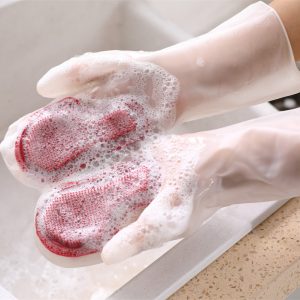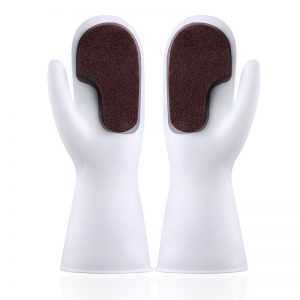Cleaning gloves are an essential tool for various household and cleaning tasks. Here’s everything you need to know about cleaning gloves:
- Types of Cleaning Gloves:
- Latex Gloves: Made from natural rubber, these gloves are affordable and provide excellent flexibility and dexterity. However, some people may be allergic to latex.
- Nitrile Gloves: These gloves are made from synthetic rubber and are an excellent alternative for those with latex allergies. They offer good chemical resistance and durability.
- Vinyl Gloves: Made from PVC, vinyl gloves are cost-effective but may offer less flexibility and puncture resistance compared to latex or nitrile gloves.
- Rubber Gloves: Usually made of natural rubber, these gloves are sturdy and provide good protection against chemicals and hot water.
- Proper Fit:
- It’s crucial to choose gloves that fit well to ensure comfort and dexterity while cleaning. Gloves that are too tight may cause discomfort, and those that are too loose can slip off or hinder movement.
- Usage Guidelines:
- Always wear gloves when handling harsh cleaning chemicals, dirty surfaces, or potential allergens to protect your skin.
- Avoid using the same pair of gloves for different tasks to prevent cross-contamination.
- Remove rings or sharp jewelry before wearing gloves to prevent punctures.
- Cleaning and Maintenance:
- Rinse gloves with water and soap after each use to remove dirt and chemicals.
- Allow gloves to dry thoroughly before storing them in a cool, dry place away from direct sunlight.
- Replace gloves if they show signs of wear, tear, or degradation.
- Safety Precautions:
- Although gloves provide protection, they are not invulnerable. Avoid exposing them to highly corrosive or toxic substances.
- Always read and follow the manufacturer’s instructions for using cleaning chemicals with gloves.
- Multi-Purpose Usage:
- Cleaning gloves are versatile and can be used for various tasks such as dishwashing, surface cleaning, gardening, and more.
- Disposable vs. Reusable Gloves:
- Disposable gloves are convenient for one-time use and should be discarded after each task to prevent the spread of germs.
- Reusable gloves are eco-friendly and can be washed and sanitized for repeated use.
- Allergies and Sensitivities:
- If you have latex allergies or sensitive skin, opt for nitrile or vinyl gloves.
- Comfort and Longevity:
- Investing in higher-quality gloves may offer better comfort, durability, and protection.
- Environmentally Friendly Options:
- Look for gloves made from biodegradable or compostable materials if you are environmentally conscious.
Remember that cleaning gloves are an aid, not a substitute for safe cleaning practices. Always use gloves in combination with proper ventilation, eye protection, and following the recommended safety guidelines for cleaning products.








